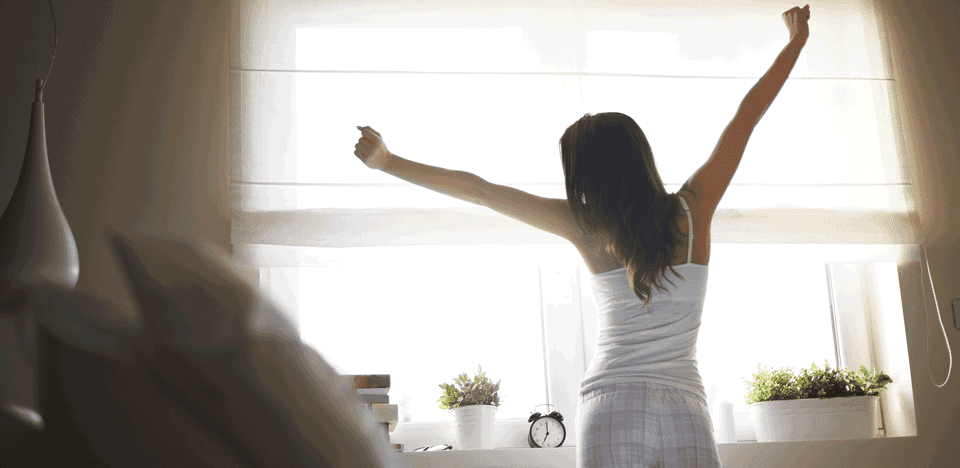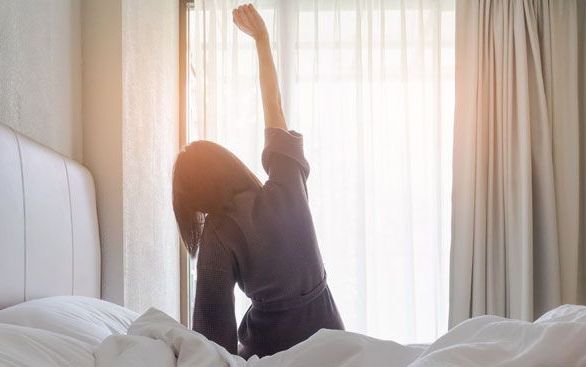Specialist Spotlight: Balancing Menopause Symptoms and Sleep
World Menopause Day takes place on 18th October; a yearly global awareness call for women who are currently approaching or experiencing the menopause.

The menopause is a natural part of ageing that usually occurs between 45 and 55 years of age, as a woman's oestrogen levels decline. For some, this can begin earlier or later in life and some of the symptoms include hot flashes, chills, weight gain, mood changes, night sweats and sleep problems (Reference: NHS Website).
For some, menopausal symptoms can often mean ‘sleeping well’ becomes an impossible dream and so we asked our resident sleep and wellbeing expert, Natalie Pennicotte-Collier, to teach us the role of sleep wellbeing in the symptoms of menopause.
Below, Natalie shares her knowledge and provides a number of effective therapies to treat the symptoms naturally with stress reduction techniques and recovery strategies.
So how is our sleep affected by the menopause?
For many women, just at the point when they peak in both career & confidence, midlife is abruptly halted when sleep disturbances, caused by the Menopause, begin.
Furthermore, some women in this particular age bracket also contend with work burnout and family stress, which can also interfere with quality of sleep too.
In these cases, protecting your emotional wellbeing is key. It’s essential for you to know how menopause affects your sleep, and what you can do to sleep well throughout all of its stages.
In my practice, I see many women for the first time when they’re experiencing the challenges that the perimenopause (a transition that occurs several years before the menopause) brings. The perimenopause can disrupt sleep routines on a regular basis due to its physical, mental and emotional symptoms.
In fact, more than one in five menopausal women reported sleep disturbance in a survey for the British Menopause Society.
What sleep disturbances can be expected?
Problems can include difficulty getting to sleep, waking during the night and waking up very early. Additionally, the most common psychological symptoms (exacerbated by sleep loss) are a loss of self-esteem, reduced confidence and heightened anxiety.
Furthermore, for those women who aren’t great sleepers to begin with, entering menopause can make insomnia even worse. Hormonal Insomnia and sleep disturbances caused by hot flashes leave many menopausal women tossing and turning or waking up drenched in sweat. The next day, irritability, anxiousness, fatigue and trouble concentrating are common following a bad night’s sleep.”
What does science say about sleep and menopause?
In 2017, the Centre for Disease Control released new scientific findings about sleep activity and most importantly sleep quality of women throughout the different stages of menopause and it found that:
- 32.5% of menopausal women sleep less than an average of 7 hours a night
- Among pre-menopausal women, 16.8% have trouble falling asleep regularly four or more times in a week
- Almost one quarter of premenopausal women (23.7%) have trouble routinely staying asleep throughout the night
- Nearly half (47%) wake feeling un-rested at least four days a week
From this, we can conclude that having a focus on the importance of sleep wellbeing is imperative during the menopause. Sleeping well is one of the most powerful tools for balancing out the ageing process and boosting emotional wellbeing.
What can we do to ease the symptoms?
Learning how to encourage plentiful, high-quality rest will support immune health, fuel the restoration and repair of cells and the production of hormones that contribute to a youthful appearance, balancing hormones, energy and strength.
Below, I share eight key things to keep in mind to help you balance sleep and menopause.
Respond & manage stress levels
As ever, learning to skilfully respond to symptoms can make all the difference.
The most effective way to support wellbeing naturally when experiencing menopausal symptoms is to learn how to manage stress, a common aggravating factor.
Learn a new way to rest
Re-learning how to rest and recover if your normal sleeping pattern is disrupted by the menopause is absolutely crucial to alleviate additional symptoms.
“Taking small steps to improve rest every day will hugely empower you so you don’t feel out of control and furthermore, help to support your stressed emotional wellbeing.
Pause & Reflect
During the menopause years, a lot of women are busy looking after everyone else and they don’t really invest in their own health and tend to overlook their sleep wellbeing.
The most important thing is to acknowledge that your body is changing and ask yourself what you may need to do differently to invest in your health for the future.
The menopause marks a new chapter in sleep and wellbeing for you and it’s important to take time to reflect on where you are in your life and be open to a new daily routine with a robust sleep and rest strategy to support and make the most of your next chapter of life.
Breathe
When in the midst of some symptoms, deep, slow breathing can stop a hot flush, night sweats, anxiety attack or menopausal rage in its tracks.
Try 4-6 deep core breaths, in through the nose and out through the mouth.
This should be enough to start switching off your stress response, ignite your parasympathetic nervous system, slow your heart rate and help you to calm down.
Meditate
Just 10 minutes of meditation each day will help keep you relaxed. Outside of my clinic, I recommend the meditation and mindfulness apps Calm and Oak – both designed to be handy helpers to guide you into meditation and good breathing practices easily.
Prepare your Sleep Environment
To cope better with the symptoms of hot flashes and night sweats, make sure the temperature in your room is comfortable, but well-ventilated and cool. Wear breathable cotton sleepwear and choose cotton sheets over synthetic materials too.
Invest in natural fibre high-quality pillows and mattresses. Progress is constantly being made to develop new levels of mattress comfort to help the delivery of a deep, energising night’s rest.
Indeed Hypnos focusses on using naturally sustainable materials like wool and cotton that help to regulate body temperature no matter the season, and wicks away moisture from the body to help you feel more comfortable throughout the night.
Bedtime
Before bed, consider taking a cool shower to set you up for a comfortable night’s sleep. If you do wake during the night due to a hot flash or another symptom, try not to lie awake and feel stressed that you aren’t sleeping or coping well. If you cannot fall back to sleep within 20 minutes, try something relaxing and restorative like yoga or meditation until you start to feel sleepy. Worrying about not sleeping can actually keep you from sleeping!
You’re not alone
Remember to ask for help. If your menopause symptoms continually keep you up at night, make an appointment to see your GP or seek expert sleep therapy support.
For more information about World Menopause Day head to the British Menopause Society: https://thebms.org.uk/




